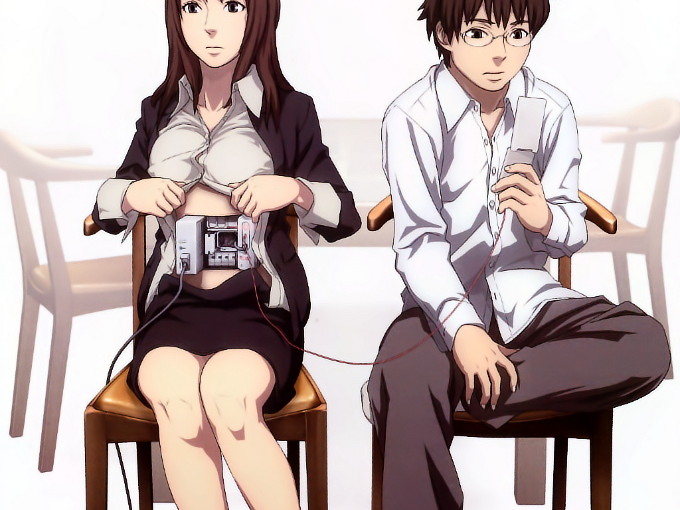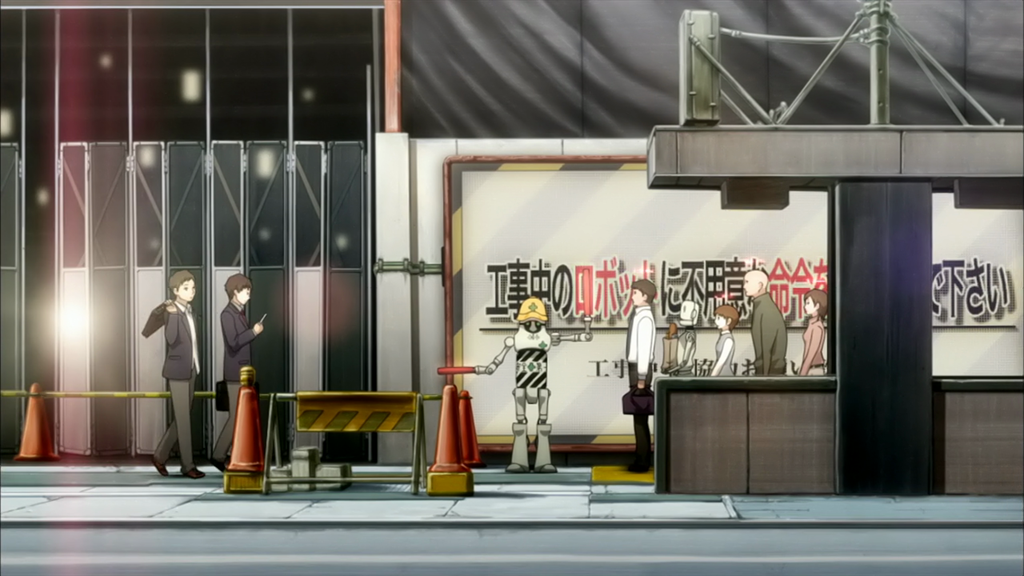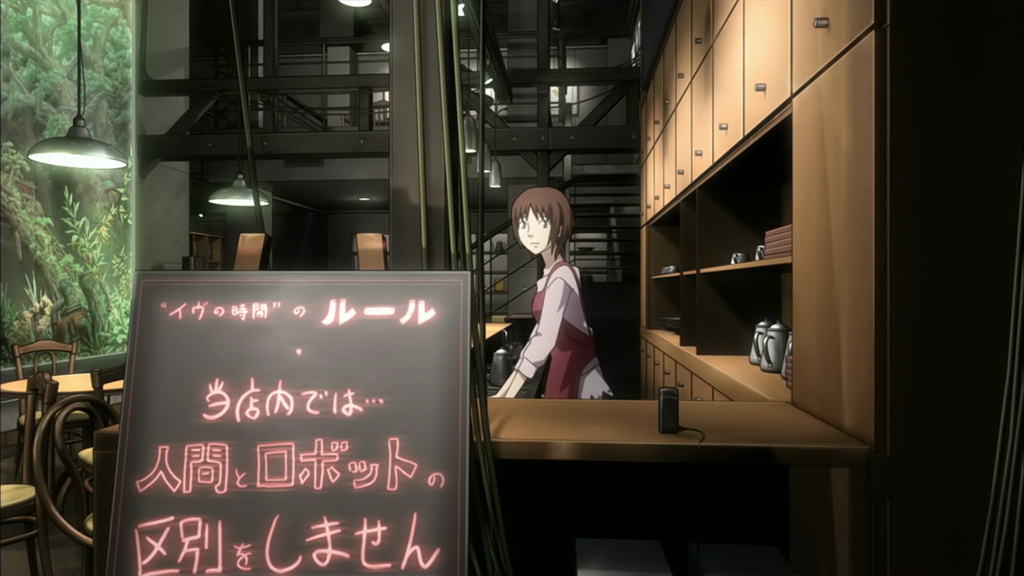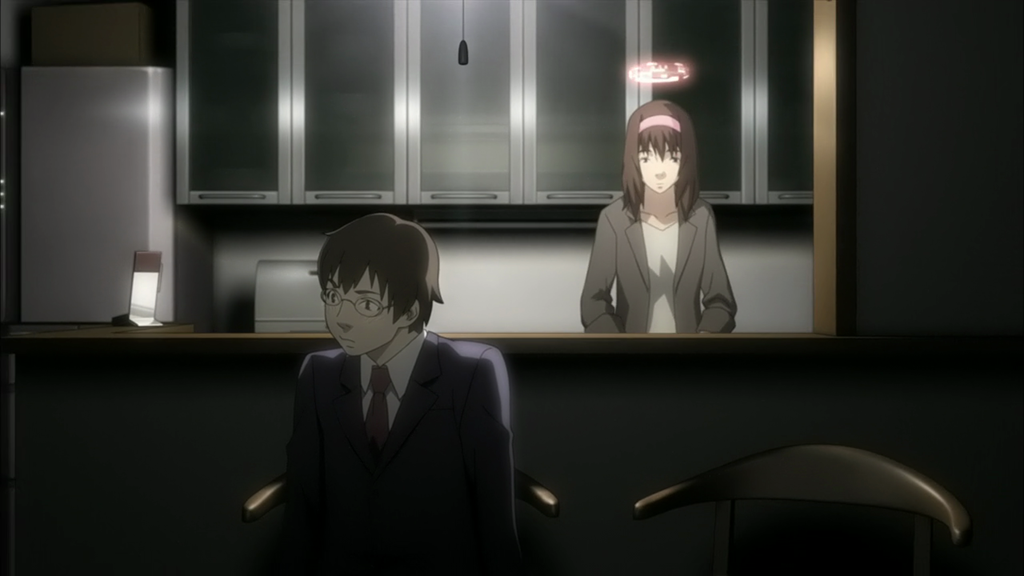イヴの時間 is an award-winning ONA (an anime series made for the Internet) written and directed by Yasuhiro Yoshiura (吉浦 康裕).
The series is just six episodes, roughly 15 minutes each (except for the last at 27 minutes), for a total running time of about 104 minutes.
イヴの時間 tells a story and features themes that would have done Isaac Asimov proud. This is fine Sci-Fi storytelling.
The setting
The series tells us that it is set “In the future, probably Japan”, though there isn’t much “probably” about that. While there are common human elements that you might find in any culture, all of that is tied off with a very Japanese ribbon.
Timewise, the series could be set sometime this century, perhaps 50 years from now. Perhaps less, if you make optimistic assumptions about Artifical Intelligence research.
Robots – with some degree of Artifical Intelligence – are common in this setting, and development of them obviously continues apace, ranging from devices in simpler, rudimentary chassis manufactured just a few years before our story, to the newer android units which are indistinguishable from humans.
While the older devices are obviously robots, the androids have a projected halo above their heads (coloured, to indicate task-statuses) that distinguishes them from humans.
In this society, robots and androids cook and clean, run errands, and make humanity’s lives easier in a myriad of ways. For humanity’s part, it is doing what humanity always does with technology – trying to figure out how it fits in, or ignoring it and hoping it will go away, or branding it as evil and campaigning for more traditional values.
People, for better or worse, are people.
The story
(mild spoilers for episode one)
Our main character is a male high-schooler by the name of Sakisaka Rikuo (向坂 リクオ). Formerly a talented pianist, he stopped playing after his last competition. An android was a guest-pianist at the competition, and he was emotionally moved by the android’s performance, leaving him confused and conflicted about his art, and about his place in it.
As our story opens, Rikuo is curious about the behaviour of Sammy (サミィ) the family’s household android. While nothing is actually wrong, per se, he feels that Sammy is absent sometimes longer than her errands would warrant, and sometimes she leaves the family apartment at odd hours.
The family isn’t inconvenienced by this, but Rikuo’s curiosity leads him to download Sammy’s system logs. In them, he finds a GPS location that he isn’t familiar with and an odd message.
Rikuo doesn’t know what he might find there, so he ropes in his school-friend, Masaki Masakazu (真崎 マサカズ), to accompany him. Together they discover a basement cafe called “イヴの時間” (Time of EVE). Posted prominently inside the door is a sign, proclaiming an absolute rule “Within this shop, we DO NOT distinguish between humans and robots.”
And indeed, there is no sign of anyone with an android halo inside, despite the fact that an android entered just before them. With nothing to distinguish androids from humans, just what sort of place have they stumbled into? And why would androids even be here?
Over the course of the series, these questions and others are posed, and explored. Not all of them are answered. Not only is the relationship between humans and androids examined, but the relationship between androids and humans.
And where do you draw the line between a person and an appliance?
Notes and observations
The animation is solid (though not exceptional), the colour palette is excellent, and so is the art.
You’ll even see some shaky-cam and motion-blur (rather than traditional animation cuts), giving a very live-action feel to the production.
Recommendation
Old-school Science-Fiction/Speculative-Fiction fans (Clarke, Asimov, Bradbury, Heinlein), this is one for you. This is a grand piece of speculative-fiction, worthy of your time.



